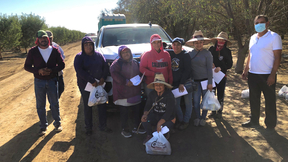Lab teams receive NNSA funding for STEM education in minority partnership
The National Nuclear Security Administration (NNSA) announced in a press release that it has awarded $4 million in grants to eight teams comprised of 22 HBCUs and six plants and laboratories. The Lab is awarded, along with HBCU institutions, in two research areas:
Malware Intelligence Harvesting for Greater Cyber Defense will identify and verify openly available malware intelligence feeds on the Internet and develop an aggregated prototype for uniform, automated distribution. (Matthew Myrick, P.I. and Tony Baylis, LLNL; Voorhees College, Allen University, Clark Atlanta University, North Carolina and A&T State University).
Experimental and Computational Studies of Matter under Extreme Environments will conduct experimental and computational investigations of materials and high-temperature plasmas under extreme conditions for advanced energy applications and fundamental science. (Christian Mailhiot, P.I., Kennedy Reed, Joe Farmer, Eric Schwegler, Peter Beiersdorfer and Hui Chen, LLNL; Tuskegee University, Benedict College and Florida A&M University).
This funding launches NNSA's new Minority Serving Institution Partnership Program (MSIPP), a consortium program organized to build a sustainable STEM pipeline between DOE plants and laboratories and HBCUs.
The MSIPP is designed to enrich the STEM capabilities of HBCUs in a sustainable manner that aligns with the broad interests of DOE sites and emphasizes the entire career pipeline. The partnership also provides STEM students with the cutting edge resources and technology housed at DOE facilities, ultimately increasing STEM student retention.
"Hands-on participation in research is imperative for students in the STEM field," said Dimitri Kusnezov, NNSA's chief scientist. "The MSIPP will provide an opportunity for students to be exposed to state-of-the-art facilities and research, creating an opportunity to expand their knowledge and further prepare them for a career in STEM fields."
To achieve MSIPP's goal, teams consisting of participants from select HBCUs and DOE plants and laboratories were developed. These teams bring together HBCUs that share similar interests in STEM research areas with the facilities and technology available at DOE's plants and laboratories. In addition to LLNL, the following six areas of research and individual funding recipients include:
- Consortium for Advanced Manufacturing (CAM): Applied Research and Workforce Development for High Power Density Electronic Device Technology: Howard University, Southern University of New Orleans, Alabama A&M University, University of the District of Columbia, KCP
- Investigating and Characterizing Catalytic Activity in Novel Materials and Processes using Experimental and Computational Techniques: Prairie View A&M University, Allen University, Morehouse, Southern A&M University, Tennessee State University, LANL
- Support Advanced Manufacturing and Pipeline of Skilled Workforce: Hampton University, North Carolina A&T State University, Clark Atlanta University, Y-12, KCP
- Addressing the Shortage of Quality Cybersecurity Workers in the U.S.: Norfolk State University, Voorhees College, Bowie State University, North Carolina A&T State University, University of the Virgin Islands, SNL
- Detection and Analysis of Chemical and Radionuclides: Alabama A&M University, Fisk University, Alcorn State University, Morehouse College, Prairie View A&M University, Southern University of Baton Rouge, Southern University of New Orleans, Y-12, LANL
- Advanced Chemometrics and in-situ analysis using Laser Ablation Multi-Collector Inductively Coupled Mass Spectroscopy and/or Laser Induced Breakdown Spectroscopy: Florida A&M University, Alabama State University, Delaware State University, PNNL
Contact
Linda A Lucchetti[email protected]
925-422-5815
Tags
Academic EngagementSTEM
NNSA
Diversity
Community Outreach
Featured Articles








